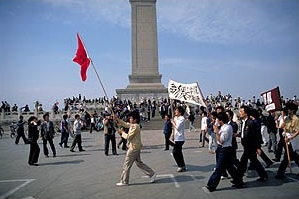
Two days ago, June 4, marked twenty-three years since the government of mainland China, ever zealous in its effort to quash all questioning and dissent, set tanks and troops armed with assault rifles upon several thousand students in Tiananmen Square in Beijing. The students had been gathering for a couple of months to call the government to greater accountability, adherence to due process, democracy, freedom of assembly and press, and freedom of speech. Hundreds, probably thousands of students died, effectively massacred on the largest open square in the world.
It was an ugly, ugly day. Although most Westerners may never experience such severe governmental reaction to peaceful dissent, those of us living in such climes should be well aware that, historically speaking, it can happen anywhere. Human freedom is so very, very fragile. Even if it is enshrined in a nation's constitution, its exercise and point nonetheless hinge on a society's willingness to tolerate the full range of its implications and expressions. Freedom can be very, very frightening to those looking in on it.
But why otherwise would it be worthwhile? Gifted by God with choice making capacities, humans are most human when they push the boundaries of the choices they make, for it is in these choices that, though they may generate much evil and pain, will, on the other hand, engender some of the greatest inventions and richest aesthetic and spiritual perspectives we know.
Aren't we a paradox?
No comments:
Post a Comment